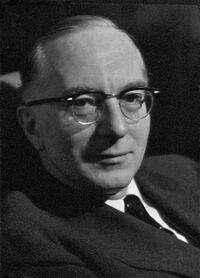Vous pouvez contribuer simplement à Wikibéral. Pour cela, demandez un compte à adminwiki@liberaux.org. N'hésitez pas !
Eric Voegelin
| Eric Voegelin | |||||
| Juriste, Philosophe | |||||
|---|---|---|---|---|---|
| Dates | 1901 - 1985 | ||||

| |||||
| Tendance | Conservatisme | ||||
| Nationalité | |||||
| Articles internes | Autres articles sur Eric Voegelin | ||||
| Citation | |||||
| Interwikis sur Eric Voegelin | |||||
Eric Voegelin, né Erich Hermann Wilhelm Voegelin le 3 janvier 1901 à Cologne (Allemagne) et mort le 19 janvier 1985 à Stanford (États-Unis), était un juriste, politologue et philosophe politique.
Biographie
Voegelin est né dans une famille de religion protestante émigrée en Autriche dès 1910.
En 1919 Voegelin fait ses études à la Faculté de droit de l'université de Vienne. En 1922 il obtint son doctorat sous la supervision du juriste austro-américain Hans Kelsen et du théoricien social autrichien Othmar Spann. Il y fréquente l'intelligentsia libérale parmi laquelle Ludwig von Mises, dont il suit le séminaire privé.
En 1924 Voegelin obtient une bourse de recherche (Laura Spelman Rockefeller Memorial Fellow) et part aux États-Unis pour poursuivre ses études postdoctorales. Il étudia jusqu'à fin 1926 à Columbia, Harvard et à l'université du Wisconsin, puis enfin à Yale. À Harvard il a suivi les cours de Alfred North Whitehead et du juriste Roscoe Pound, à l'université Columbia ceux de John Dewey et de John R. Commons à l’Université du Wisconsin. Après un court séjour en France, il revient à Vienne en 1927 et reprend son poste d'assistant en droit auprès de Hans Kelsen.
En 1928 il publie son premier livre, Über die Form des amerikanischen Geistes (Sur la forme de l’esprit américain).
Il finit sa carrière à la Hoover Institution, à Stanford.
Sa pensée
La pensée de Voegelin est influencée par le conservatisme contemporain. Il considère que les « idéologies » de Hegel et de Karl Marx sont responsables des dérives politiques modernes que sont le nazisme et le communisme. La modernité s'enracine selon lui dans la tentative politique violente de faire descendre le paradis sur Terre, en s'appuyant sur une théologie chrétienne mal digérée. Les tenants de ces idéologies veulent faire de l'accès aux moyens du bonheur ici bas la fin ultime de toute politique. Ce faisant, la sécularisation de thématiques chrétiennes se transforme en idéologies anti-chrétiennes, dans le communisme, le national-socialisme et d'autres formes de totalitarisme.
Informations complémentaires
Publications
- 1928, Über die Form des amerikanischen Geistes, Tübingen
- 1952, "The New Science of Politics: An Introduction", Chicago and London: The University of Chicago Press
- 1953, "The Origins of Totalitarianism", Review of Politics, Vol 15, pp68-85
- 1956, "Order and History, Vol 1: Israel and Revelation", Louisiana State University Press
- 1959, "Diskussionsbereitschaft", ("La volonté de débattre"), In: Albert Hunold, dir., "Erziehung zur Freiheit", ("Éducation sur la liberté"), Erlenbach-Zürich: E. Rentsch
- 1961, "On Readiness to Rational Discussion", In: Albert Hunold, dir., "Freedom and Serfdom. An Anthology of Western Thought", Dordrecht: D. Reidel Publishing Company, pp269-284
- 1968, "Science, Politics, and Gnosticism", Chicago: Gateway
- The Beyond and its Parousia, conférence à l’Université Santa Clara (Californie) le 15 octobre 1982
- L'au-delà et sa parousie, Revue des sciences philosophiques et théologiques, vol. tome 93, no. 4, 2009, pp. 807-829.
Notes et références
Littérature secondaire
- 1955, F. R. Buckley, "The Dreamers", commentaire du livre d'Eric Voegelin, "The New Science of Politics", The Freeman, August, Vol 5, n°14, pp621-622
- 1973, Ellis Sandoz, "Voegelin read anew. Political philosophy in the age of ideology", Modern Age, Vol XVII, Summer, pp257-263
- Repris en 2000, "Voegelin read anew. Political philosophy in the age of ideology", In: George A. Panichas, dir., "Modern Age, the first twenty-five years: a selection", Indianapolis: LibertyPress, pp277-285
- 1975, Dante Germino, "Eric Voegelin. The in-between of human life", In: Kenneth Minogue, Anthony de Crespigny, dir., "Contemporary Political Philosophers", London: Methuen; New York: Dodd, Mead, pp100-119
- 1982, Gerhart Niemeyer, "Eric Voegelin, 1952", Modern Age, Summer, Vol 26, n°3, pp262-265
- 1987, Stephen A. McKnight, "Eric Voegelin’s Search For Order In History", University Press of America
- 2002, Michael Federici, "Eric Voegelin", Wilmington, DE: ISI Books
- 2007, Linda Raeder, "Voegelin on Gnosticism, Modernity, and the Balance of Consciousness", The Political Science Reviewer, Vol 36, pp344-370
- 2010, James L. Wiser, "Eric Voegelin and American Conservatism", In: Kenneth L. Deutsch, Ethan Fishman, dir., "The dilemmas of American conservatism", University Press of Kentucky, pp29-46
- 2018,
- Gene Callahan, Lee Trepanier, dir., "Tradition v. Rationalism: Voegelin, Oakeshott, Hayek, and Others", Lexington Books
- David Corey, "Eric Voegelin’s Critique of Ideology", In: Gene Callahan, Lee Trepanier, dir., "Tradition v. Rationalism: Voegelin, Oakeshott, Hayek, and Others", Lexington Books
- Colin Cordner, "The Diagnosis of Scientism: Eric Voegelin and Michael Polanyi on Science and Philosophy", In: Gene Callahan, Lee Trepanier, dir., "Tradition v. Rationalism: Voegelin, Oakeshott, Hayek, and Others", Lexington Books
- Daniel John Sportiello, "Rationalism in Eric Voegelin", In: Gene Callahan, Lee Trepanier, dir., "Tradition v. Rationalism: Voegelin, Oakeshott, Hayek, and Others", Lexington Books
- Mark T. Mitchell, "Personal Participation: Michael Polanyi, Eric Voegelin, and the Indispensability of Faith", In: Gene Callahan, Lee Trepanier, dir., "Tradition v. Rationalism: Voegelin, Oakeshott, Hayek, and Others", Lexington Books
- 2020, Michael P. Federic, "Eric Voegelin and Enlightenment Rationalism", In: Gene Callahan, Kenneth McIntyre, dir., "Critics of Enlightenment Rationalism", London: Palgrave Macmillan, pp211-226
Liens externes
- (fr)Eric Voegelin (1901-1985), Jacob Schmutz
- (fr)La philosophie de l'ordre d'Eric Voegelin, Jacob Schmutz, Revue Philosophique de Louvain. Quatrième série, tome 93, n°3, 1995. pp. 255-284
- (fr)Corps mystique et société politique chez Eric Voegelin, Thierry Gontier
- "A Guide to the Thought of Eric Voegelin", commentaire de Gregory Wolfe sur le livre coordonné par Stephen A. McKnight, "Eric Voegelin’s Search For Order In History", diffusé sur le site The imaginative conservative, le 23 février 2011.
| Accédez d'un seul coup d’œil au portail philosophie et épistémologie du libéralisme. |